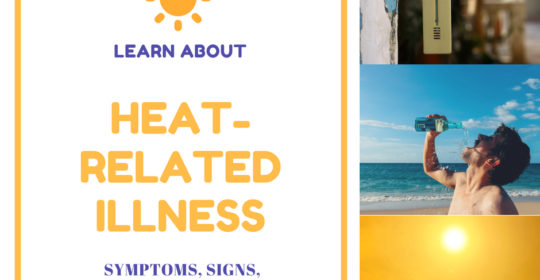
Heat-Related Illness
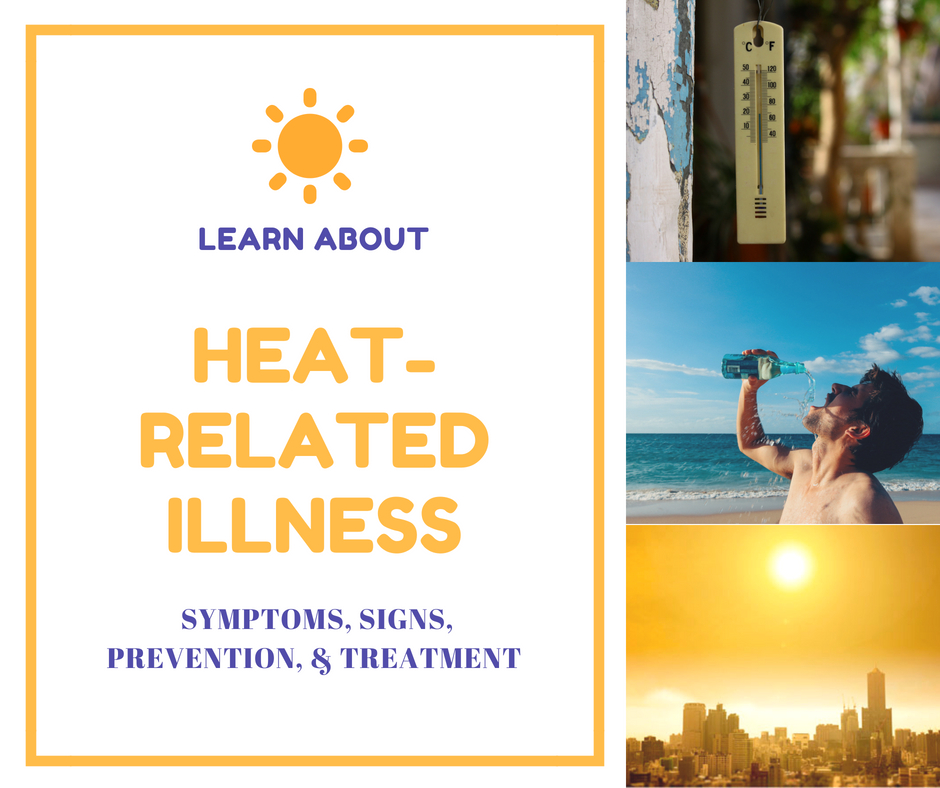
Now is the time to prepare for the high temperatures. While Heat-related deaths and illness are preventable, many people still die from extreme heat every year. According to the Centers for Disease Control and Prevention (CDC), extreme heat causes more than 600 deaths each year.
What is Heat-Related Illness?
Heat illness or heat-related illness is a spectrum of disorders caused by environmental exposure to heat. It includes minor conditions such as heat cramps, heat syncope or fainting, and heat exhaustion, as well as the more severe condition known as heat stroke.
People suffer heat-related illness when the body’s temperature control system is overloaded. The body normally cools itself by sweating, but under some conditions, sweating just isn’t enough. In such cases, a person’s body temperature rises rapidly. Very high body temperatures may damage the brain or other vital organs. Several factors affect the body’s ability to cool itself during extremely hot weather. When the humidity is high, sweat will not evaporate as quickly, preventing the body from releasing heat quickly. Other conditions that can limit the ability to regulate temperature include old age, youth (age 0-4), obesity, fever, dehydration, heart disease, mental illness, poor circulation, sunburn, and prescription drug and alcohol use.
Who is Most at Risk?
- Drink Plenty of Fluids: Drink more fluids, regardless of how active you are. Don’t wait until you’re thirsty to drink. If your doctor limits the amount you drink or has you on water pills, ask how much you should drink while the weather is hot.
- Stay away from very sugary or alcoholic drinks—these actually cause you to lose more body fluid. Also avoid very cold drinks, because they can cause stomach cramps.
- Replace salt and minerals: Heavy sweating removes salt and minerals from the body that need to be replaced. A sports drink can replace the salt and minerals you lose in sweat. If you are on a low-salt diet, have diabetes, high blood pressure, or other chronic conditions, talk with your doctor before drinking a sports beverage or taking salt tablets.
Some people are more at risk of developing a heat-related illness than others.
What are the warning signs and symptoms of Heat-Related Illness?
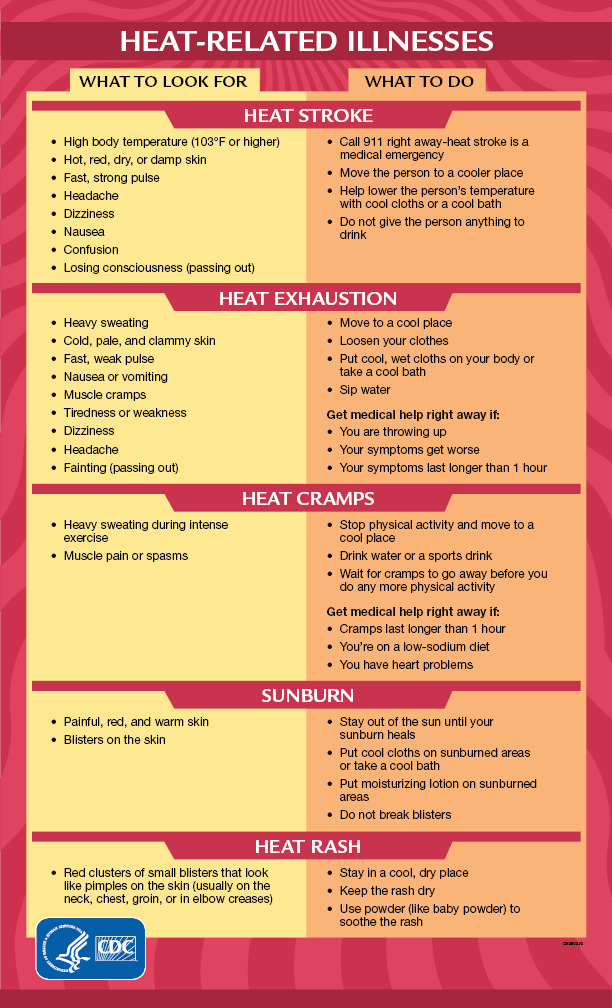
How to prevent Heat-Related Illness?
Follow the CDC’s 3 simple tips to stay cool and safe in hot weather:
1. Stay cool
- Wear Appropriate Clothing: Choose lightweight, light-colored, loose-fitting clothing.
- Stay Cool Indoors: Stay in an air-conditioned place as much as possible. If your home does not have air conditioning, go to the shopping mall or public library—even a few hours spent in air conditioning can help your body stay cooler when you go back into the heat. Call your local health department to see if there are any heat-relief shelters in your area.
- Do not rely on a fan as your primary cooling device during an extreme heat event. Electric fans may provide comfort, but when the temperature is in the high 90s, they will not prevent heat-related illnesses.
- Taking a cool shower or bath or moving to an air-conditioned place is a much better way to cool off.
- Use your stove and oven less to maintain a cooler temperature in your home.
- Do Not Leave Children in Cars: Cars can quickly heat up to dangerous temperatures, even with a window cracked open. While anyone left in a parked car is at risk, children are especially at risk of getting a heat stroke or dying.
- Avoid Hot and Heavy Meals: They add heat to your body!
Schedule Outdoor Activities Carefully:
- Try to limit your outdoor activity to when it’s coolest, like the morning and evening hours. Rest often in shady areas so that your body has a chance to recover.
- Pace yourself: Cut down on exercise during the heat. If you’re not accustomed to working or exercising in a hot environment, start slowly and pick up the pace gradually. If exertion in the heat makes your heart pound and leaves you gasping for breath, STOP all activity. Get into a cool area or into the shade, and rest, especially if you become lightheaded, confused, weak, or faint.
- Always wear sunscreen: Sunburn affects your body’s ability to cool down and can make you dehydrated. If you must go outdoors, protect yourself from the sun by wearing a wide-brimmed hat, sunglasses, and by putting on sunscreen of SPF 15 or higher 30 minutes prior to going out. Continue to reapply it according to the package directions. Look for sunscreens that say “broad spectrum” or “UVA/UVB protection” on their labels- these products work best.
2. Stay hydrated
- Drink Plenty of Fluids: Drink more fluids, regardless of how active you are. Don’t wait until you’re thirsty to drink. If your doctor limits the amount you drink or has you on water pills, ask how much you should drink while the weather is hot.
- Stay away from very sugary or alcoholic drinks—these actually cause you to lose more body fluid. Also avoid very cold drinks, because they can cause stomach cramps.
- Replace salt and minerals: Heavy sweating removes salt and minerals from the body that need to be replaced. A sports drink can replace the salt and minerals you lose in sweat. If you are on a low-salt diet, have diabetes, high blood pressure, or other chronic conditions, talk with your doctor before drinking a sports beverage or taking salt tablets.
3. Stay informed
- Know the Signs: Learn the signs and symptoms of heat-related illnesses and how to treat them.
- Check for Updates: Check your local news for extreme heat alerts and safety tips and to learn about any cooling shelters in your area.
Source:
CDC


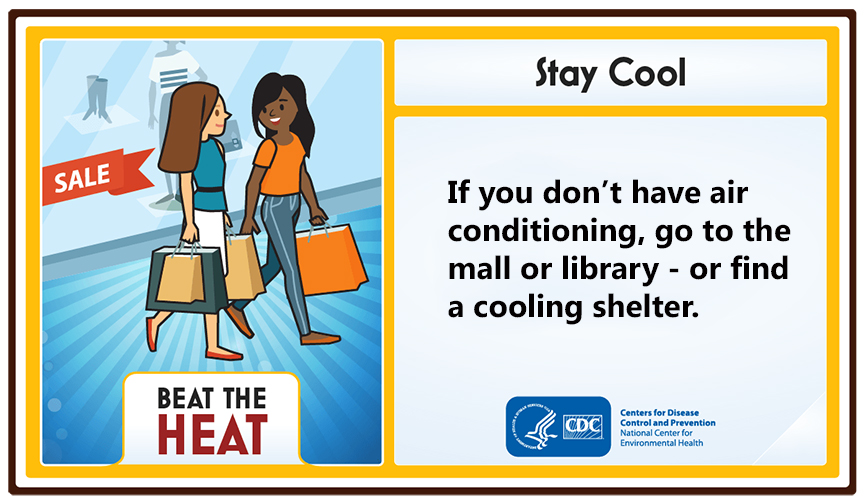
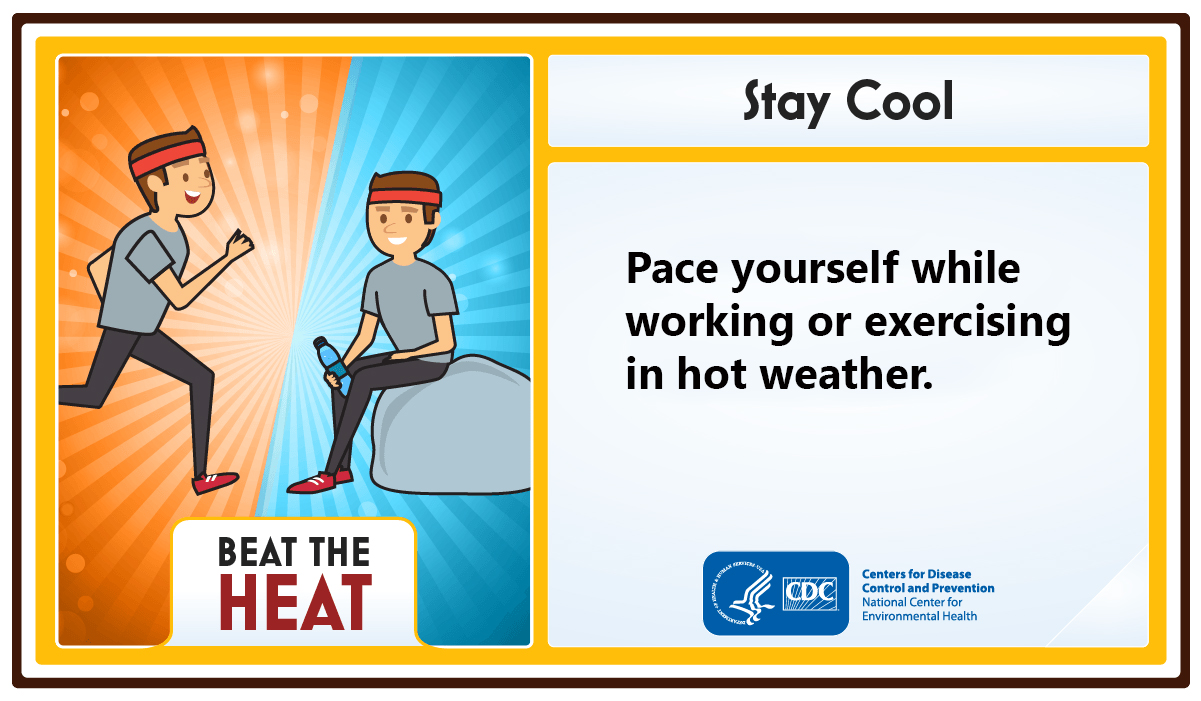
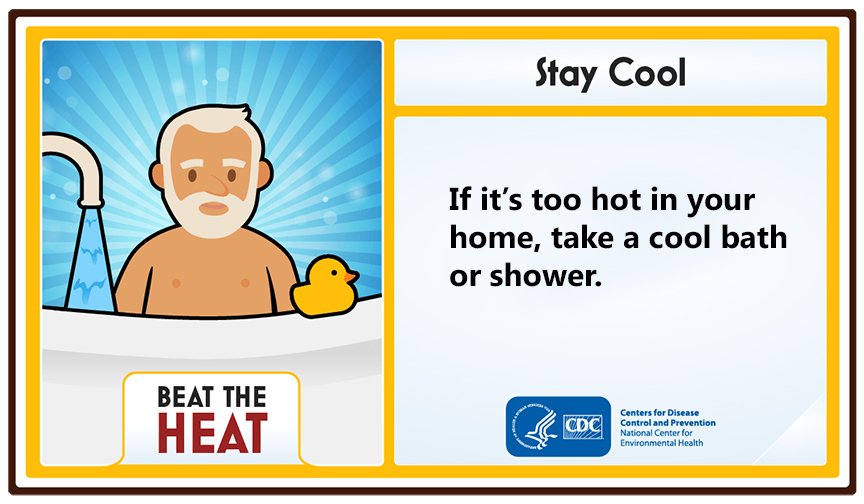
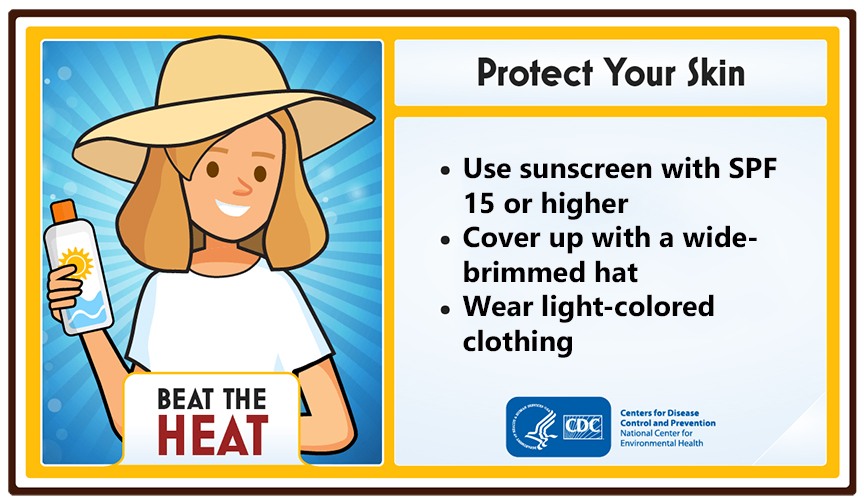
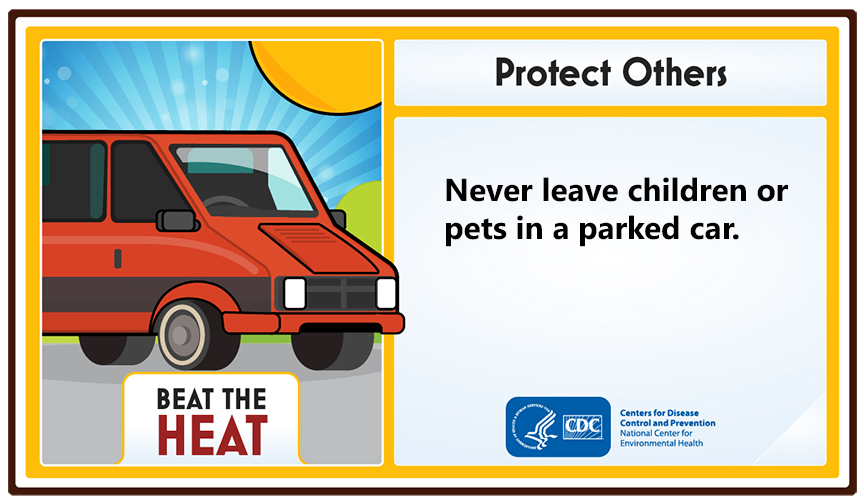

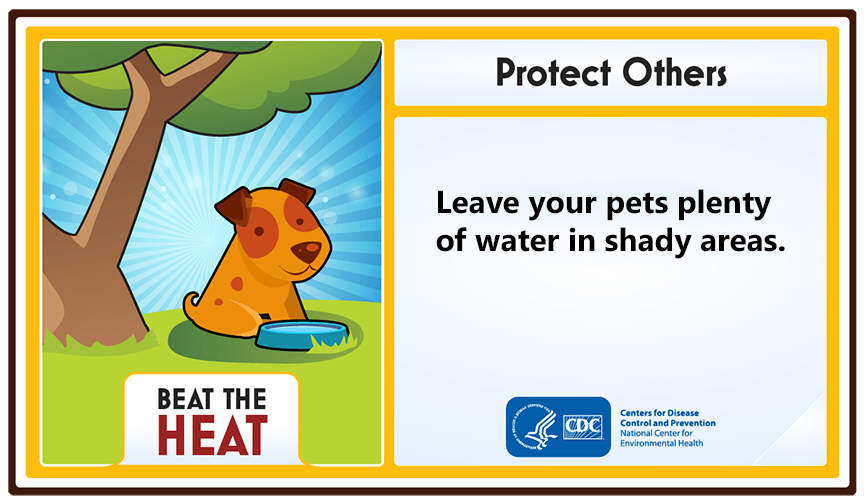
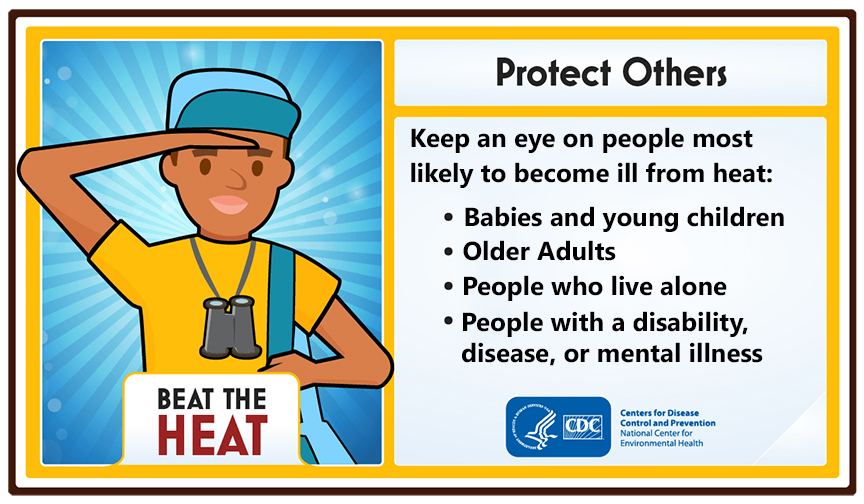
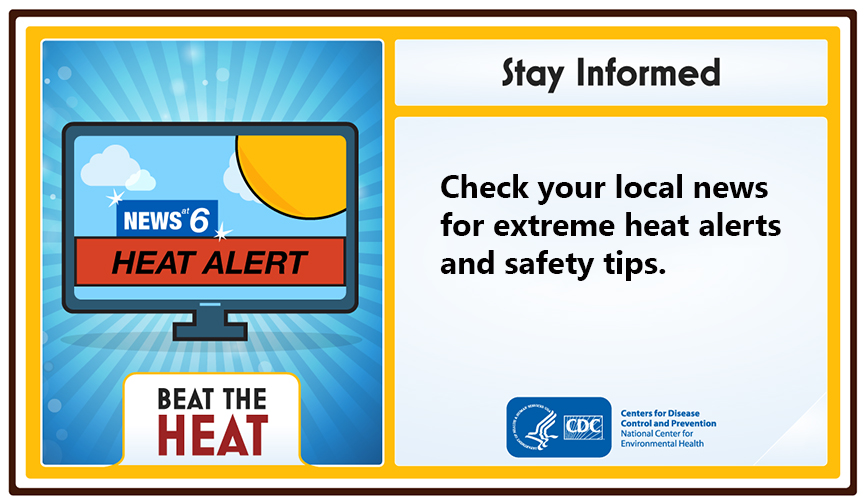
Most Commented